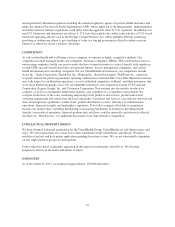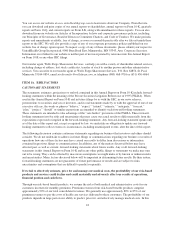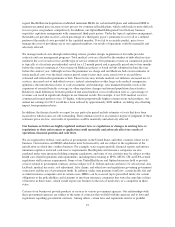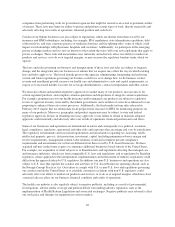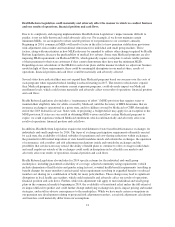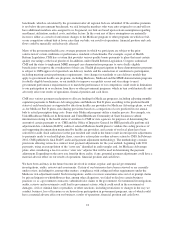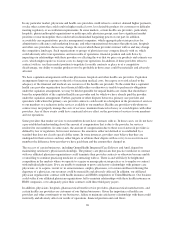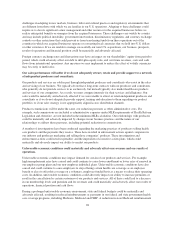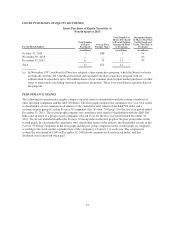United Healthcare 2013 Annual Report Download - page 28
Download and view the complete annual report
Please find page 28 of the 2013 United Healthcare annual report below. You can navigate through the pages in the report by either clicking on the pages listed below, or by using the keyword search tool below to find specific information within the annual report.In any particular market, physicians and health care providers could refuse to contract, demand higher payments,
or take other actions that could result in higher medical costs, less desirable products for customers or difficulty
meeting regulatory or accreditation requirements. In some markets, certain health care providers, particularly
hospitals, physician/hospital organizations or multi-specialty physician groups, may have significant market
positions or near monopolies that could result in diminished bargaining power on our part. In addition,
accountable care organizations, practice management companies, which aggregate physician practices for
administrative efficiency and marketing leverage, and other organizational structures that physicians, hospitals
and other care providers choose may change the way in which these providers interact with us and may change
the competitive landscape. Such organizations or groups of physicians may compete directly with us, which
could adversely affect our operations, and our results of operations, financial position and cash flows by
impacting our relationships with these providers or affecting the way that we price our products and estimate our
costs, which might require us to incur costs to change our operations. In addition, if these providers refuse to
contract with us, use their market position to negotiate favorable contracts or place us at a competitive
disadvantage, our ability to market products or to be profitable in those areas could be materially and adversely
affected.
We have capitation arrangements with some physicians, hospitals and other health care providers. Capitation
arrangements limit our exposure to the risk of increasing medical costs, but expose us to risk related to the
adequacy of the financial and medical care resources of the health care provider. To the extent that a capitated
health care provider organization faces financial difficulties or otherwise is unable to perform its obligations
under the capitation arrangement, we may be held responsible for unpaid health care claims that should have
been the responsibility of the capitated health care provider and for which we have already paid the provider
under the capitation arrangement. Further, payment or other disputes between a primary care provider and
specialists with whom the primary care provider contracts could result in a disruption in the provision of services
to our members or a reduction in the services available to our members. Health care providers with whom we
contract may not properly manage the costs of services, maintain financial solvency or avoid disputes with other
providers. Any of these events could have a material adverse effect on the provision of services to our members
and our operations.
Some providers that render services to our members do not have contracts with us. In those cases, we do not have
a pre-established understanding about the amount of compensation that is due to the provider for services
rendered to our members. In some states, the amount of compensation due to these out-of-network providers is
defined by law or regulation, but in most instances, the amount is either not defined or is established by a
standard that does not clearly specify dollar terms. In some instances, providers may believe that they are
underpaid for their services and may either litigate or arbitrate their dispute with us or try to recover from our
members the difference between what we have paid them and the amount they charged us.
The success of certain businesses, including OptumHealth Integrated Care Delivery and Amil, depend on
maintaining satisfactory physician relationships. The primary care physicians that practice medicine or contract
with our affiliated physician organizations could terminate their provider contracts or otherwise become unable
or unwilling to continue practicing medicine or contracting with us. There is and will likely be heightened
competition in the markets where we operate to acquire or manage physician practices or to employ or contract
with individual physicians. If we are unable to maintain or grow satisfactory relationships with primary care
physicians, or to acquire, recruit or, in some instances, employ physicians, or to retain enrollees following the
departure of a physician, our revenues could be materially and adversely affected. In addition, our affiliated
physician organizations contract with health insurance and HMO competitors of UnitedHealthcare. Our business
could suffer if our affiliated physician organizations fail to maintain relationships with these health insurance or
HMO companies, or to adequately price their contracts with these third party payers.
In addition, physicians, hospitals, pharmaceutical benefit service providers, pharmaceutical manufacturers, and
certain health care providers are customers of our Optum businesses. Given the importance of health care
providers and other constituents to our businesses, failure to maintain satisfactory relationships with them could
materially and adversely affect our results of operations, financial position and cash flows.
26


